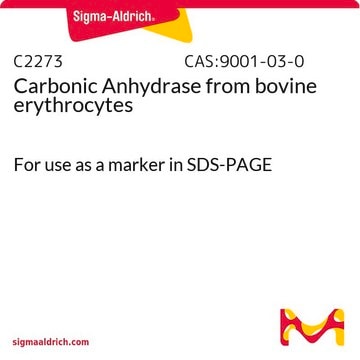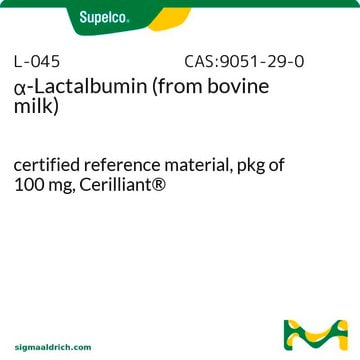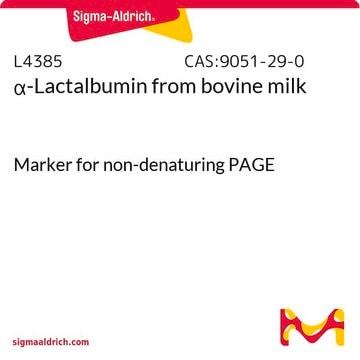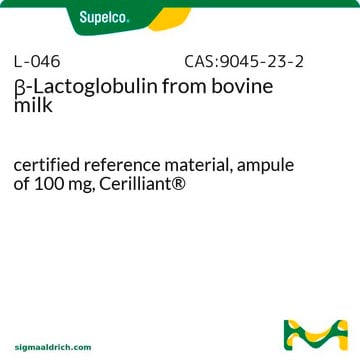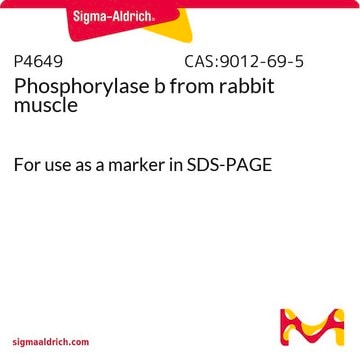L6385
α-Lactalbumin from bovine milk
For use as a marker in SDS-PAGE
Sinónimos:
alpha-lactalbumin
Iniciar sesiónpara Ver la Fijación de precios por contrato y de la organización
About This Item
Productos recomendados
biological source
bovine milk
Quality Level
form
powder
mol wt
~14.2 kDa
packaging
vial of 5 mg
technique(s)
electrophoresis: suitable
solubility
H2O: soluble 10 mg/mL
UniProt accession no.
storage temp.
2-8°C
Gene Information
cow ... LALBA(281894)
¿Está buscando productos similares? Visita Guía de comparación de productos
General description
α-Lactalbumin is a small, globular, whey protein that has been found in all milk studied to date. It is a metalloprotein of approximately 14 kDa produced in the mammary glands.
Application
α-Lactalbumin from bovine milk is suitable for use:
- as an electrophoresis marker, with a molar mass of approximately 14,200Da
- in a study to investigate selective binding of proteins on charged surface iron oxide nanoparticles via reverse charge parity model
Biochem/physiol Actions
α-Lactalbumin consists of a single polypeptide chain with 8 cysteines which form disulfide bridges. α-Lactalbumin binds several metal ions, including calcium, which is thought to play a role in the regeneration of native α-lactalbumin from the reduced, denatured form. α-Lactalbumin also has a distinct zinc binding site that is thought to play a role in the binding of the lactose synthase complex. The mature protein consists of 123 amino acid residues (14 kD), and it has a three-dimensional structure with 1.7 Angstrom resolution, demonstrating four a-helices and a triple stranded antiparallel β-sheet.
Alters the substrate specificity of galactosyltransferase to increase the rate of lactose formation; the complex of galactosyltransferase and α-lactalbumin is called lactose synthase. Site-directed mutagenesis of Asp87 or Asp88 to Ala completely abolishes the strong calcium binding affinity and reduces the stimulation of lactose synthase to <3.5% of the maximal rate.
Certificados de análisis (COA)
Busque Certificados de análisis (COA) introduciendo el número de lote del producto. Los números de lote se encuentran en la etiqueta del producto después de las palabras «Lot» o «Batch»
¿Ya tiene este producto?
Encuentre la documentación para los productos que ha comprado recientemente en la Biblioteca de documentos.
Los clientes también vieron
Guanhao Bu et al.
Journal of the science of food and agriculture, 90(12), 2015-2020 (2010-06-29)
The main whey proteins alpha-lactalbumin (alpha-LA) and beta-lactoglobulin (beta-LG) are considered as the major allergens in cow's milk. Microbial fermentation can produce some proteolytic enzymes, which can induce the degradation of milk protein allergens. In this study, the effects of
Selective binding of proteins on functional nanoparticles via reverse charge parity model: an in vitro study.
Ghosh G, et, al.
Materials Research Express, 1 (2014)
Haidong Tan et al.
Biotechnology letters, 27(16), 1177-1182 (2005-09-15)
Recombinant human interleukin-1 receptor antagonist (rHuIL-1ra) was produced in E. coli as an inclusion body. rHuIL-1ra was purified to Over 98% purity by anion exchange chromatography after on-column refolding. The optimized processes produced more than 2 g pure refolded rHuIL-1ra
S Yefimov et al.
Journal of biochemical and biophysical methods, 42(1-2), 65-78 (2000-01-27)
Five SDS-proteins, ranging in molecular weight from 14 to 66 kDa, were detected without covalent fluorescent labeling by the automated gel electrophoresis apparatus with intermittent fluorescence scanning (HPGE apparatus, LabIntelligence) during electrophoresis in barbiturate buffer in the presence of Cascade
Eric Lorent et al.
Vaccine, 26(3), 399-410 (2007-12-14)
The structure of the ectodomain of the hepatitis C envelope glycoprotein E1 (E1s) was characterised by spectroscopic methods. Monomeric E1s was purified from a mammalian and from a Hansenula polymorpha cell lysate, and cysteine-blocked monomers were reconstituted into stable particles.
Nuestro equipo de científicos tiene experiencia en todas las áreas de investigación: Ciencias de la vida, Ciencia de los materiales, Síntesis química, Cromatografía, Analítica y muchas otras.
Póngase en contacto con el Servicio técnico




